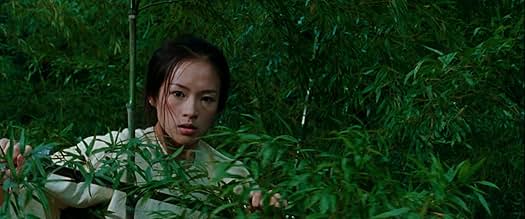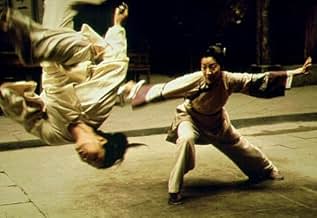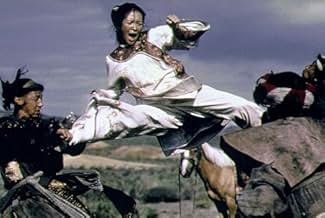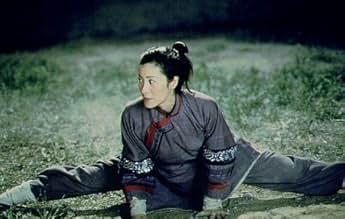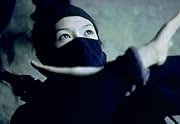Uma jovem guerreira chinesa rouba uma espada de um famoso espadachim e foge para um mundo de aventura romântica com um homem misterioso na fronteira do país.Uma jovem guerreira chinesa rouba uma espada de um famoso espadachim e foge para um mundo de aventura romântica com um homem misterioso na fronteira do país.Uma jovem guerreira chinesa rouba uma espada de um famoso espadachim e foge para um mundo de aventura romântica com um homem misterioso na fronteira do país.
- Direção
- Roteiristas
- Artistas
- Ganhou 4 Oscars
- 101 vitórias e 132 indicações no total
Chow Yun-Fat
- Master Li Mu Bai
- (as Chow Yun Fat)
Ziyi Zhang
- Jen
- (as Zhang Ziyi)
Pei-Pei Cheng
- Jade Fox
- (as Cheng Pei-Pei)
Deming Wang
- Tsai
- (as Wang De Ming)
Suying Huang
- Auntie Wu
- (as Huang Su Ying)
Jinting Zhang
- De Lu
- (as Zhang Jin Ting)
Jianhua Feng
- Gou Jun Sinung
- (as Feng Jian Hua)
Zhenxi Du
- Shop Owner
- (as Du Zhen Xi)
Cheng Lin Xu
- Captain
- (as Xu Cheng Lin)
Avaliações em destaque
As a film student living in Toronto, I look forward to the Toronto International Film Festival every year. Last year, the highlight of the festival for me was American Beauty. This year, it would have to be (so far) Ang Lee's "Crouching Tiger, Hidden Dragon".
Being of Asian descent, I've seen my share of wu xia genre movies to last me a life time. However, most of them are so centred on the fighting, that they forget the rest of the elements that are involed. The movie turns into one long scripted fighting scene with maybe a slight hint of story. Crouching Tiger, on the other hand realizes these issues, and builds these oh-so entertaining action sequences into an epic with typical asian themes such as true love and honour.
Being an epic, one would expect the usual long takes and establishing shots, and boy does it ever look beautiful. Traversing through a myriad of regions spanning the lengh of China (from the deserts to bamboo forests, to mountains high in the clouds), the film soley based on its asthetic properties is nothing short of stunning. The lighting of different landscapes and the exquisitly designed costumes all radiate with stunning colour. And then there's the cinemetography. Wow! The backdrops, establishing shots look absolutely marvelous. If your jaw dropped when you saw Rome and its coliseum in Gladiator, wait until you see ancient Beijing recreated on the screen!
Okay, so it's a good looking movie. What about the story? The complexity of the plot is rather sparse, probably reminiscent of epics such as Braveheart or Gladiator, which is by no means a bad thing. Although both Chow Yun Fat and Michelle Yeo did have major parts, this movie belongs mostly to Zhang Ziyi who IMHO did an amazing job playing a very complex role (one which required her to represent nobily as a princess, naivness, as well as show inner strength). Mainly concentrating on her unwillingness to give in to the ideals of an arranged marriage, the decently written script adds a story of an old warrior trying to retire and a 300+ year old sword.
All in all, this film blends story, well choreographed action, and a stylistic eye to create a mythilogical piece that not only represents the wu xia genre justly by doing it well, but also contributes to raising the quality of filmmaking usually applied in the making of a similar type of film.
Being of Asian descent, I've seen my share of wu xia genre movies to last me a life time. However, most of them are so centred on the fighting, that they forget the rest of the elements that are involed. The movie turns into one long scripted fighting scene with maybe a slight hint of story. Crouching Tiger, on the other hand realizes these issues, and builds these oh-so entertaining action sequences into an epic with typical asian themes such as true love and honour.
Being an epic, one would expect the usual long takes and establishing shots, and boy does it ever look beautiful. Traversing through a myriad of regions spanning the lengh of China (from the deserts to bamboo forests, to mountains high in the clouds), the film soley based on its asthetic properties is nothing short of stunning. The lighting of different landscapes and the exquisitly designed costumes all radiate with stunning colour. And then there's the cinemetography. Wow! The backdrops, establishing shots look absolutely marvelous. If your jaw dropped when you saw Rome and its coliseum in Gladiator, wait until you see ancient Beijing recreated on the screen!
Okay, so it's a good looking movie. What about the story? The complexity of the plot is rather sparse, probably reminiscent of epics such as Braveheart or Gladiator, which is by no means a bad thing. Although both Chow Yun Fat and Michelle Yeo did have major parts, this movie belongs mostly to Zhang Ziyi who IMHO did an amazing job playing a very complex role (one which required her to represent nobily as a princess, naivness, as well as show inner strength). Mainly concentrating on her unwillingness to give in to the ideals of an arranged marriage, the decently written script adds a story of an old warrior trying to retire and a 300+ year old sword.
All in all, this film blends story, well choreographed action, and a stylistic eye to create a mythilogical piece that not only represents the wu xia genre justly by doing it well, but also contributes to raising the quality of filmmaking usually applied in the making of a similar type of film.
What people who aren't Chinese and who don't know much about Chinese culture fail to understand, is that the warrior mythology portrayed in films like Crouching Tiger, Hidden Dragon and Hero has its roots in a particular genre of fiction that has been around much longer than television or film.
Having grown up reading a bunch of these stories of epic fantasy, I remember being surprised when I went to watch CTHD in the theaters, and saw the audience break out in laughter at the flying stunts. I suppose the concept probably does seem ridiculous to foreigners.
The whole deal with the flying is this:
In the stories, the world of "Giang Hu" mentioned in CTHD is the unconventional part of society in which the characters that practice high transcendent martial arts exist. "Giang Hu" literally translates to something like "lakes and rivers", which kind of is a cultural allusion to the fact that most of these people wander a whole lot participating in great duels of swordsmanship and all kinds of tragic drama.
One of the forms of transcendent martial arts is "chin guon", which translates to something like "the art of lightness". It's a skill that these warrior folk develop from a young age using various methods that make it so they can move as if they were light as a feather. I think the idea is that they're trained so that they progressively have less and less of a perception of their own weight, and thus they can run up walls and fly across rooftops in style.
There's another type of martial art which involves transmitting "chi" (spiritual essence or whatever you want to call it) through your hands or fingertips and into the pressure points of others, either doing them harm, rendering them unable to move, or restoring some of their strength.
If you don't understand that it's another culture's fiction/mythology and can't get over that it defies known physics and medicine etc., well, too bad.
At the same time, look at acupuncture. Millions swear by the benefits of acupuncture. Hell, my father had a stroke that paralyzed half his face and went to four separate doctors. They couldn't do a damn thing. He then went to an acupuncturist and after two sessions the paralysis was gone. Conventional medicine still has no idea how acupuncture could possibly work, yet a lot of doctors will accept it as a viable option. Who the hell knows, maybe once upon a time in China people could fly.
I find Chinese warrior mythology pretty interesting, and the problem is that these novels do not translate well. I'm not sure if anyone has ever tried. A lot of what goes on in them has a lot of cultural relevance and wouldn't be readily understood by certain people who have Western sensibilities. Hong Kong and Taiwan have for a couple of decades produced a lot of television shows that portray these stories, but they're mostly pretty cheesy like American soap operas.
Which is why CTHD is semi-important as a film. It's the first film to expose a lot Americans to this facet of Chinese mythology, and I hope it's not the last.
Having grown up reading a bunch of these stories of epic fantasy, I remember being surprised when I went to watch CTHD in the theaters, and saw the audience break out in laughter at the flying stunts. I suppose the concept probably does seem ridiculous to foreigners.
The whole deal with the flying is this:
In the stories, the world of "Giang Hu" mentioned in CTHD is the unconventional part of society in which the characters that practice high transcendent martial arts exist. "Giang Hu" literally translates to something like "lakes and rivers", which kind of is a cultural allusion to the fact that most of these people wander a whole lot participating in great duels of swordsmanship and all kinds of tragic drama.
One of the forms of transcendent martial arts is "chin guon", which translates to something like "the art of lightness". It's a skill that these warrior folk develop from a young age using various methods that make it so they can move as if they were light as a feather. I think the idea is that they're trained so that they progressively have less and less of a perception of their own weight, and thus they can run up walls and fly across rooftops in style.
There's another type of martial art which involves transmitting "chi" (spiritual essence or whatever you want to call it) through your hands or fingertips and into the pressure points of others, either doing them harm, rendering them unable to move, or restoring some of their strength.
If you don't understand that it's another culture's fiction/mythology and can't get over that it defies known physics and medicine etc., well, too bad.
At the same time, look at acupuncture. Millions swear by the benefits of acupuncture. Hell, my father had a stroke that paralyzed half his face and went to four separate doctors. They couldn't do a damn thing. He then went to an acupuncturist and after two sessions the paralysis was gone. Conventional medicine still has no idea how acupuncture could possibly work, yet a lot of doctors will accept it as a viable option. Who the hell knows, maybe once upon a time in China people could fly.
I find Chinese warrior mythology pretty interesting, and the problem is that these novels do not translate well. I'm not sure if anyone has ever tried. A lot of what goes on in them has a lot of cultural relevance and wouldn't be readily understood by certain people who have Western sensibilities. Hong Kong and Taiwan have for a couple of decades produced a lot of television shows that portray these stories, but they're mostly pretty cheesy like American soap operas.
Which is why CTHD is semi-important as a film. It's the first film to expose a lot Americans to this facet of Chinese mythology, and I hope it's not the last.
As Ang Lee, I grew up reading wuxia novels in Taiwan. Those novels usually mixed engrossing history, thrilling action, enchanting romance. But when these novels were made into movies or TV series, none of them could match my imagination. It's either because of wrong casting, bad acting, tedious costumes, sloppy storytelling, minimal budget (so everything is shot in studio rather than in the grand Chinese landscapes as they were told in books), fake action... I could go on and on. Now Ang Lee finally made a wuxia film that captures my imagination and fulfills my dream of childhood.
The casting of CTHD is perfect. No disrespect to Jet Li, but Jet Li would not make Li Mu Bai into what he should be: noble, wise but weary. Chow Yun Fat conveys the unspoken feelings of Li Mu Bai in a way I can't imagine anyone else can. But he's known for his acting, Michelle Yeoh was known for her fighting skills. Here in CTHD, she proves herself as an excellent dramatic actress. The secrete longing for Li and the confusion of Li's true feelings were clearly conveyed by her eyes. The scenes between them are heartbreaking. Zhang Zi Yi is a true discovery! What a wonderful talent to steal scenes after scenes from the veterans around her. She ran from looking innocent, haughty, feisty to loving and distraught. She made the complex Jen a real flesh and blood believable human being. Chang Chen made a perfectly sexy and charming bandit.
The scenery and the photography was beyond belief. The majestic landscapes of China match my imagination when I read all the beautiful Chinese poems of the Tang and Sung dynasties. No wonder those poets could come up with those masterpieces. They sure had the best inspiration. Peter Pau not only captured the landscapes and the settings, he also managed to capture the fast-as-lightening action wonderfully. The shot of Jen gliding over water just lodged in my mind. The soundtrack is also excellent. Tan Dun used different instruments to match the different locales. He mixed in Central Asian music in the desert sequence and Chinese flute in the Southern China scenes. Yo-yo Ma's cello in the main theme makes me want to weep everytime I hear it.
The storytelling was also done expertly. As a romantic-at-heart, I love the desert romance between Jen and Lo. It's one of the most charming and believable love stories that I can remember. Most people gave credit of the fighting to Yuen Wo Ping. I'd give kudos to Ang Lee. I've seen Yuen's martial art films before, but they're never done in such an imaginative and artistic way. The artistic vision has to come from Ang Lee.
To sum it up, three cheers for Ang Lee! You not only fulfilled your childhood dream, you fulfilled mine too. It's such a pleasure to finally see a wuxia novel be done right. Thank you! Thank you! Thank you!
The casting of CTHD is perfect. No disrespect to Jet Li, but Jet Li would not make Li Mu Bai into what he should be: noble, wise but weary. Chow Yun Fat conveys the unspoken feelings of Li Mu Bai in a way I can't imagine anyone else can. But he's known for his acting, Michelle Yeoh was known for her fighting skills. Here in CTHD, she proves herself as an excellent dramatic actress. The secrete longing for Li and the confusion of Li's true feelings were clearly conveyed by her eyes. The scenes between them are heartbreaking. Zhang Zi Yi is a true discovery! What a wonderful talent to steal scenes after scenes from the veterans around her. She ran from looking innocent, haughty, feisty to loving and distraught. She made the complex Jen a real flesh and blood believable human being. Chang Chen made a perfectly sexy and charming bandit.
The scenery and the photography was beyond belief. The majestic landscapes of China match my imagination when I read all the beautiful Chinese poems of the Tang and Sung dynasties. No wonder those poets could come up with those masterpieces. They sure had the best inspiration. Peter Pau not only captured the landscapes and the settings, he also managed to capture the fast-as-lightening action wonderfully. The shot of Jen gliding over water just lodged in my mind. The soundtrack is also excellent. Tan Dun used different instruments to match the different locales. He mixed in Central Asian music in the desert sequence and Chinese flute in the Southern China scenes. Yo-yo Ma's cello in the main theme makes me want to weep everytime I hear it.
The storytelling was also done expertly. As a romantic-at-heart, I love the desert romance between Jen and Lo. It's one of the most charming and believable love stories that I can remember. Most people gave credit of the fighting to Yuen Wo Ping. I'd give kudos to Ang Lee. I've seen Yuen's martial art films before, but they're never done in such an imaginative and artistic way. The artistic vision has to come from Ang Lee.
To sum it up, three cheers for Ang Lee! You not only fulfilled your childhood dream, you fulfilled mine too. It's such a pleasure to finally see a wuxia novel be done right. Thank you! Thank you! Thank you!
There are two movies in the martial art fiction genre that are competing against each other for my no. 1 wuxia movie: Hero (by Yimou Zhang) and Crouching Tiger, Hidden Dragon. Now, tbh, the score is so tied that I'll choose the first one I saw and therefore had more time to grow inside my heart, namely Hero, BUT... that isn't to say there is one movie better than the other. If I saw this one first, it would have been my favorite.
It's true that Hero succeeds this movie and I'm not sure if Zhang hasn't drawn inspiration from Ang Lee's movie but I think Hero tackles some themes that one rarely sees being explored whereas Crouching Tiger feels a bit more ''western'' in its approach, especially with that mystery subplot. That makes it a bit easier to watch and doesn't require that much patience (though I, as an Eastern European, had a hard time at the beginning distinguishing people, maybe because I'm not yet used to that Manchurian queue hairstyle).
I've found the cinematography exquisite. There was one scene when Jen knelt down in water in the middle of a cave and looked up to the dark sky while the rain was washing her from her previous sins, baptizing her in the name of good. It was just splendid. Another magnificent scene happened in the pine forest but I can't describe in into words, you have to see it with your own eyes.
I've already adored Ziyi Zhang from Memoirs of a Geisha but now I think I'm falling in love with her :)) . Michelle Yeoh was a well-received presence, as always. Her character brought a balance between the more romantic, juvenile world of youth where family and society hinders relationships and the more mature world of adults where you are so often your own hurdle, not allowing yourself to move further and express your true feelings.
A 9,4 out of 10 from me.
It's true that Hero succeeds this movie and I'm not sure if Zhang hasn't drawn inspiration from Ang Lee's movie but I think Hero tackles some themes that one rarely sees being explored whereas Crouching Tiger feels a bit more ''western'' in its approach, especially with that mystery subplot. That makes it a bit easier to watch and doesn't require that much patience (though I, as an Eastern European, had a hard time at the beginning distinguishing people, maybe because I'm not yet used to that Manchurian queue hairstyle).
I've found the cinematography exquisite. There was one scene when Jen knelt down in water in the middle of a cave and looked up to the dark sky while the rain was washing her from her previous sins, baptizing her in the name of good. It was just splendid. Another magnificent scene happened in the pine forest but I can't describe in into words, you have to see it with your own eyes.
I've already adored Ziyi Zhang from Memoirs of a Geisha but now I think I'm falling in love with her :)) . Michelle Yeoh was a well-received presence, as always. Her character brought a balance between the more romantic, juvenile world of youth where family and society hinders relationships and the more mature world of adults where you are so often your own hurdle, not allowing yourself to move further and express your true feelings.
A 9,4 out of 10 from me.
I just saw this film today. I was totally captivated... when it was all over, and the credits began to run, it took me a couple of seconds to realize where I was. I didn't want to get out of my seat. And once I got out of the theatre, I couldn't even talk about it for an hour or so. I kept running the details over and over in my head. It's rare that a film has such an impact on me. The cinematography was stunning. The special effects were beautifully done. The characters' moves were effortless. The acting was wonderful. I really think that Michelle Yeoh should have been nominated for an Oscar for Best Actress. I thought that the effects and storyline complimented each other brilliantly. There were so many different layers to the plot. There were many things that couldn't be explained with dialogue that were expressed in the characters' faces. This film had lighthearted moments, heartwrenching moments, romantic interludes, inspirational sentiments, wonderful plot twists, superb acting, beautifully done fight scenes, never before seen special effects...it had it all. Some scenes may have been a little over the top, but it's *fantasy*... and yet, after a few brief moments, it somehow became completely believable. That's how much this film draws you in. This is a one of a kind film; there is just no comparing it to any other. It transports you to another place and time. I highly recommend it.
Você sabia?
- CuriosidadesMichelle Yeoh deliberately did not work for a year before filming began so she could concentrate on training and learning Mandarin.
- Erros de gravação(at around 1h 30 mins) During the fight between Yu Shu Lien and Xiou Long, many floor tiles are smashed by Shu Lien. After Shu Lien discards her heavy metal weapon and continues to fight, the tiles appear intact.
- Cenas durante ou pós-créditosThe opening title appears in Chinese and English.
- Versões alternativasAn English dubbed version was created for the home video market.
- Trilhas sonorasA Love Before Time
Music Composed by Jorge Calandrelli, Dun Tan
Lyrics by James Schamus, Elaine Chow (Translation)
Performed by Coco Lee featuring Cello Solo by Yo-Yo Ma
Coco Lee appears courtesy of Sony Music Entertainment (Holland) B.V.
Principais escolhas
Faça login para avaliar e ver a lista de recomendações personalizadas
Detalhes
- Data de lançamento
- Países de origem
- Central de atendimento oficial
- Idiomas
- Também conhecido como
- El tigre y el dragón
- Locações de filme
- Empresas de produção
- Consulte mais créditos da empresa na IMDbPro
Bilheteria
- Orçamento
- US$ 17.000.000 (estimativa)
- Faturamento bruto nos EUA e Canadá
- US$ 128.530.421
- Fim de semana de estreia nos EUA e Canadá
- US$ 663.205
- 10 de dez. de 2000
- Faturamento bruto mundial
- US$ 213.979.405
- Tempo de duração
- 2 h(120 min)
- Cor
- Mixagem de som
- Proporção
- 2.39 : 1
Contribua para esta página
Sugerir uma alteração ou adicionar conteúdo ausente


